Just because summer and COPD don’t always play nice together, doesn’t mean that they can’t be friends! We are going to take an in-depth look at how summer can affect your COPD and we will discuss a variety of different tips and strategies you can use to make your summer as enjoyable as possible!
How Summer Affects Your COPD
Summer can be a tricky time of year if you suffer from COPD or any respiratory disease for that matter. As mentioned earlier, there are a number of different seasonal factors that can significantly impact your COPD ranging from extreme temperatures to poor air quality.
Extreme Heat
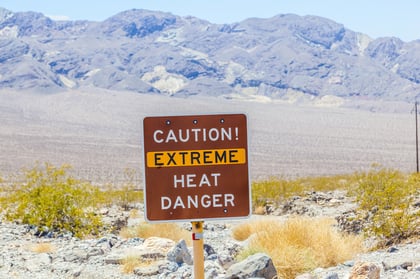
One of the most common and debilitating summer COPD irritants is the extreme heat. If you are lucky enough to live in an area with a mild climate, you probably don’t experience the difficulties of extreme heat. For those of you who don’t have that luxury, you can definitely feel the heat overtake your body, but how does it affect your COPD?
Throughout the day your body is programmed to work and maintain a normal body temperature around 98.6 degrees. When you are exposed to extreme heat your body has to work much harder to help you cool down and maintain a normal temperature.
On top of your body using more energy to regulate your body temp, if it gets too hot outside you may experience difficulties breathing. When you’re outside and you breathe in hot air it can worsen inflamed and irritated airways. Hot air can also lack a lot of oxygen, making it very hard to get enough oxygen with each breath.
To make matters worse, the damage already done to your lungs causes your body to use up to 10 times more energy than normal just to breathe. So if you’re using more energy to breathe and more energy to regulate your body temperature, you may notice that you become fatigued very quickly in the extreme heat.
Extreme Humidity
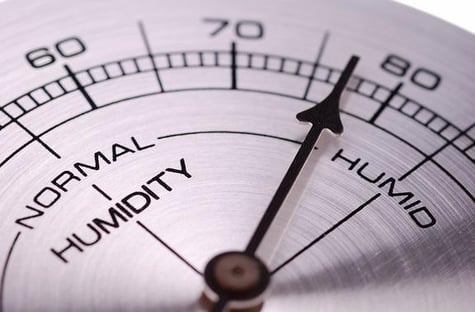
Humidity is a tricky COPD irritant. Some people thrive in humid environments while others hate the humidity because it causes breathing problems and other COPD complications.
Hot, humid air is heavy and hard to breathe. It can make you seem short of breath the entire time you’re exposed to the humidity and sometimes it can feel impossible to regain your breath, even when you get out of the humidity. But the humidity alone isn’t the single cause of the problem.
High humidity levels outside can translate to lower air quality for a couple of different reasons. First, more humidity means more smog. An article published by the Advanced Healthcare Network reports that hot humid days are usually accompanied by high levels of smog. As you probably already know, smog and pollution can worsen your COPD symptoms or even cause you to have an exacerbation.
Along with increased levels of smog, high levels of allergens are typically found in the air when humidity is present. According to the Asthma and Allergy Foundation as many as 50 million people in the United States suffer from allergies, nearly 30% of the adult population, including those with COPD, and the numbers continue to rise.
Allergies can make living with COPD extremely difficult, especially when it is hot and humid out. They can cause your airways to inflame or become irritated, make you sneeze uncontrollably, give you a scratchy throat which causes you to cough, and they can induce other symptoms unrelated to your COPD.
How You Can Beat the Summer Heat

Just because the summer season has the potential to cause COPD complications doesn’t mean that you should dread this time of year. It doesn’t mean you have to lock yourself in your house. While there may be some compromises and sacrifices you need to make, you will still be able to enjoy summer to the fullest by following these tips!
Pay Attention to Weather Reports
We talked a lot about extreme heat in the first portion of this blog post, but what qualifies as extreme?
Generally speaking, anything above 90 degrees Fahrenheit is considered extreme heat, however, these are just recommendations for you to use. Heat may affect you differently than it may affect someone else with COPD. With that being said it’s important for you to listen to what your body is trying to tell you. If you notice when the temp is above 80 that your symptoms worsen, use the 80-degree mark as your threshold instead of the 90-degree threshold.
You should be checking the weather reports on a daily basis. You can watch the news, check the weather on your computer, or simply look at the weather on your smartphone to plan for the week ahead.
If you use the weather app on your phone or if you check the weather online, you will be able to get an hourly forecast to help you plan your day. It’s best if you avoid going outside in the heat of the day, typically between the hours of 12:00pm and 4:00pm.
If you have errands to run or things to do outside and you know it’s going to be a scorcher, plan to do those things earlier in the day between 8:00am and 11:00am or later in the day after 4:00pm.
By scheduling your plans around the heat of the day you will notice fatigue doesn’t set in as quickly and you will have more energy to last you throughout the day.
Stay Cool

Living with COPD can cause your body to use 10 times as much energy just to breathe, which means you don’t have a lot of extra energy to spare. Unfortunately, the extreme heat will cause your body to start using your excess energy to help you cool down.
When you know the weather is going to be hot, don’t sit around and wait for it to blow over. Take action and help keep your body as cool as possible. Here is a list of things you can do to stay cool:
Stay Hydrated
- Drinking more water is probably mentioned in the majority of articles written about COPD and it’s easy to see why. Not only does it help thin mucus, keep your immune system strong, and prevent muscle cramps; staying hydrated helps regulate your body temperature.
Eat Lighter Meals
- Overeating is never good for COPD. It can cause severe discomfort and bloating which may also cause you to feel short of breath. But that’s not all… Overeating can also cause your body’s temperature to rise as many as 2 degrees. While that may not seem like a lot, your body will have to work harder to cool you down.
Wear Appropriate Clothing
- What you wear can have a significant impact on your body temperature and your comfort level in the summer. It’s a simple, but very effective strategy. When you know it’s going to be hot, wear lightweight, loose fitting clothes. Cotton is a great lightweight material that will allow airflow to pass freely through your clothes. If you have to go outside, try to wear light colored clothing to help you stay as cool as possible.
Avoid Excess Activity Outside
- Spending time outside in the summer is a favorite activity for a lot of people. And we want you to get outdoors and be active as much as possible. However, during the summer months when temperatures are scorching, you need to limit the amount of time you spend out in the heat. You can do this by going outside before or after the heat of the day has passed, or you can stay inside and enjoy your air-conditioned home. To help limit your time in the sun; have a plan that ensures you can workout at home, have a set grocery schedule so you don’t have to go out in the heat, and have your family and friends come over for lunch/dinner instead of going out.
How You Can Beat Humidity

Humidity is a completely different animal compared to heat in terms of how it affects COPD patients. Generally speaking, an ideal humidity level for COPD patients ranges between 30%-50%. However, some patients do much better in humid climates, whereas others do much better in dry, arid climates.
Regardless of which group you fall into, there are going to be times when the humidity is too much and causes some complications with your COPD. Not to mention, it’s not just the humidity outdoors that you need to be concerned about. Don’t worry too much though, these tips will help you beat the humidity and make your summer much more comfortable!
Check Weather Reports
There isn’t a lot you can do in regards to outdoor humidity levels aside from check your local weather report every day. This is especially true since humidity affects everyone so differently.
Just check your local weather report and take notice of the humidity level. If it is too humid or not humid enough for you, avoid going out until the humidity levels are within your comfort zone.
As you check the local weather, be on the lookout for rainy days and thunderstorms in the forecast. If you notice that you are supposed to get a storm in the near future, you may want to rearrange your plans to ensure you get everything done before the storm comes. That way you don’t have to subject yourself to high humidity levels.
Regulate Humidity Indoors
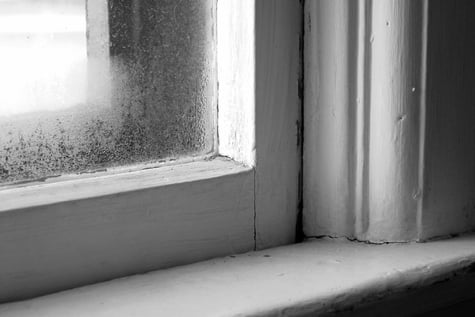
Although you cannot change the humidity outdoors, you can certainly control the humidity levels in your house. For starters, if you think your house is too humid or not humid enough there are inexpensive hygrometers you can purchase online or in stores like Wal-Mart that will accurately measure the humidity level in your house.
Once you test your humidity levels in your house you will then be able to take the next steps to make your home a COPD safe-haven. Here are several ways you will be able to regulate the humidity levels in your house:
Keep Your Windows and Doors Closed
- One of the easiest ways you can regulate humidity levels in your house is by keeping your windows and doors closed during the day. This will prevent humid air from entering your home and it will keep the cool, dry air in.
Run Your Air Conditioning Unit
- Running your air conditioning unit is another easy and effective way to regulate humidity levels in your home. The cold air reduces humidity and makes your house more comfortable in the process. If you have an older home/air conditioning unit, it may not be as effective at regulating the humidity levels in your home.
Invest in a Dehumidifier
- Although it’s not the cheapest option, it’s definitely one of the most effective ways to regulate humidity levels in your home. A dehumidifier sucks in surrounding air, cools it off to extract the moisture from the air and leaves your house feeling great. You can get a single room dehumidifier or you can get a whole house dehumidifier, whichever you think will work best for your needs.
Invest in a Humidifier
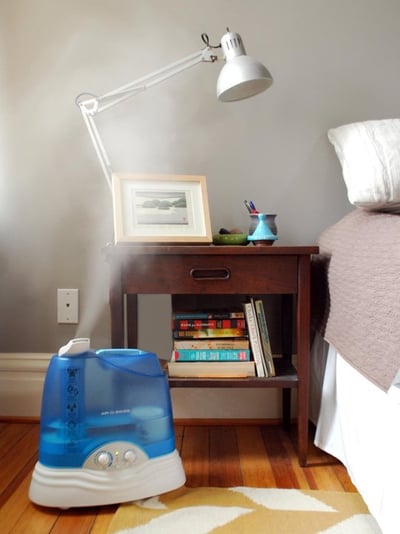
- If your house or room isn’t humid enough for your liking, simply purchase a whole house or single room humidifier. The humidifier will help regulate the humidity levels to your liking and make you more comfortable.
Vent Appliances That Produce Humidity
- There are a number of different household appliances that can increase the humidity levels in your home while they are running. To prevent the humidity from building up in your home you should vent these appliances. Most dryers have vents pointing outdoors, but stoves and dishwashers may need some extra ventilation. You can use the stove fan for a quick and easy way to vent your stove or dishwasher to prevent humidity from building up.
Always Run Your Bathroom Fan/Open Your Bathroom Window When Showering
- Showering is not an easy task when you suffer from COPD. It takes a lot of energy and can leave you feeling short of breath from washing your hair and body. That’s not even taking the extra humidity into account. Before you hop in the shower, turn your bathroom fan on and/or open a window to prevent the humidity and steam from building up. This will make it easier for you to catch your breath after your shower.
How You Can Beat Other Summer COPD Irritants
Summer heat and humidity are probably the two biggest COPD irritants you will have to worry about this time of year. But they aren’t the only ones that can cause your symptoms to worsen.
With the summer heat and humidity comes higher levels of smog and higher levels of allergens in the air. This is especially true if you live in urban areas with a lot of automobile traffic. While allergens really only affect people who suffer from allergies, smog and pollution affect everyone with COPD. In fact, environmental pollution is one of the leading causes of COPD in non-smokers.
So what can you do to beat allergens and pollution?
Check Air Quality Reports

- Before you go outside and expose yourself to poor air quality, take the time to check out the air quality in your area. If you suffer from allergies and you notice the allergy forecast is medium to high, it’s best that you avoid going outside during the middle of the day. As far as air quality goes, there are 6 levels of the air quality index (AQI). If you’re extremely sensitive to pollutants, you should limit your time outside unless the AQI states your area has “Good” air quality. If you’re not that sensitive to pollution, you will be safe going outside when the AQI states your area has “Good” or “Moderate” air quality. If the AQI states that your air quality “USG” or worse, limit your time outside and stay indoors during the middle of the day when smog levels are at their highest.
You can check the air quality in your area at www.airnow.gov
You can check allergen levels in your area at www.pollen.com
Keep Windows Closed
- There’s no denying that having the windows open on a nice day can be refreshing, but when you’re living with COPD you need to take precautions before leaving your windows open all day. Using the websites listed above, check the air quality and allergen levels in your area. Don't forget to check your local weather to see expected temperatures and humidity levels. If they are in your safe range you can open your windows, but if not make sure you keep your windows closed to prevent pollutants, allergens, humidity, and heat from taking over your home.
Vacuum and Dust Regularly
- No matter how hard you try, you aren’t going to be able to keep your house pollutant and allergen free. It’s just not possible. You will track them in from outside when you run errands. If you have a pet that goes outside, they will track them in. And your guests will track them in as well. The best way to combat the buildup of dust and allergens in your home is to vacuum and dust regularly. If possible, enlist the help of family members so you don’t overexert yourself or expose yourself to all that dust. Try to vacuum once or twice a week and dust once a month (or more if needed). This should really cut back on the amount of allergens and dust building up.
Have Your Air Ducts Cleaned Regularly
- Having your ducts cleaned regularly can be very beneficial for your breathing, but it must be done properly. Let your duct cleaning company know you have a respiratory disease and that harsh chemicals cannot be present when you return to your home. Not everyone needs their ducts cleaned so use your best judgment or have someone come take a look before you make a decision.
Get Pets Groomed Regularly

- No matter how much your fur baby loves you, they just can’t help the fact that they track dirt, dust, and allergens into your home. You can’t fault them for it, nor do you love them any less because of it. However, you can get them groomed regularly to make them as clean as possible! Depending on your animal, once a month should do the trick. We recommend having someone else groom them so you don’t overexert yourself while cleaning them.
Remove Throw Rugs
- They might look great and go perfectly with your décor, but throw rugs can really be a burden for your COPD. They are a haven for dust and allergens; especially those that get the most foot traffic. Not only can throw rugs harbor COPD irritants, they can be a major safety hazard. You can trip on the corners and your oxygen tubing can get caught up on them as well. If you absolutely cannot get rid of your rugs, clean them regularly, at least once per week.
Change Clothes When Necessary
- When you go outside for extended periods of time you can get allergens and dust caught in your clothing. To prevent them from causing any issues with your COPD, head to your room when you get home and change into a clean set of clothes. As an extra precaution, keep your dirty clothes hamper in a closet or in an area you typically don’t spend a lot of time in.
Conclusion
As is the case with pretty much everything related to COPD, summer affects each person with COPD differently. You need to do what works best for you to ensure you are feeling the best you can each and every day.
If that means taking one of the tips and modifying it to suit your needs, go for it. If that means disregarding a couple of tips, go for it.
We want you to have an amazing summer with as much freedom as possible. To help you kick start your efforts to better manage your COPD this summer, download your free COPD meal plan created by nutritionist and best-selling author Kellie Hill!
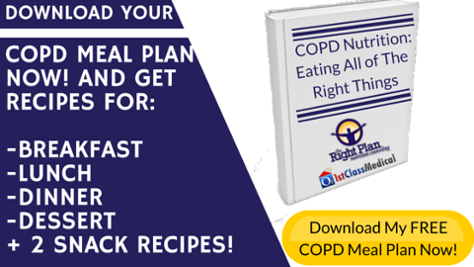
Related Blog Posts
- COPD and Depression: How Can You Take Your Life Back?
- Insomnia and COPD: How to Improve Your Sleep Quality
- Portable Oxygen Concentrators and Summer Heat
Sources:
http://blog.copdfoundation.org/copd-and-hot-summer-heat/
https://lunginstitute.com/blog/staying-cool-this-summer-with-copd/
https://www.verywell.com/copd-the-heat-is-on-914679
http://www.healthline.com/health/copd/humidity#3
https://www.sleepapnea.com/blog/post/87252837972/summers-heat-could-exacerbate-copd-symptoms
https://www.lung.ca/news/expert-opinions/pollution/heat-and-humidity




